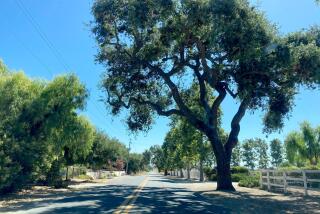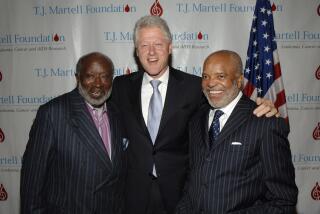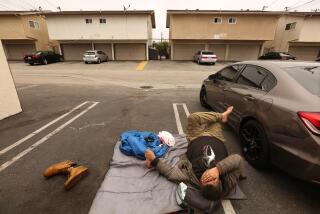Rove: From Beltway Inciter to Insider
- Share via
WASHINGTON — When President Bush sought to coax Los Angeles Mayor Richard Riordan into the race for California governor, it was chief political strategist Karl Rove who quietly went to work.
When Bush considered closing the Navy bombing range in Puerto Rico, Rove helped push the decision along. And as Bush ponders the touchy issue of stem-cell research, it is Rove who is sounding out Catholic leaders.
The ascendance of the Texas transplant, who grew up with the president in Republican politics, speaks not just to their deep personal relationship. It also attests to the pervasiveness of the so-called permanent campaign--where seeking and holding political office become the same blur of polling, policy and positioning.
Bush ran for president decrying the constant campaign footing of the Clinton White House, an anti-Washington message fashioned by a Washington outsider: Rove.
Yet Rove now has emerged as one of the most powerful Washington insiders, an omnibus advisor whose portfolio ranges from state campaigns to national security to international affairs--with politics always the overriding concern. “There’s nothing untouched by him or that he doesn’t understand,” said Mary Matalin, a cohort on the senior White House staff.
By straddling the divide between politics and policy in such obvious fashion, Rove has opened himself to personal attack, including recent questions about his financial dealings. He also has invited a more jaundiced view of the Bush White House.
“It basically begs to attach a political motivation to every policy decision,” said Charles Cook, a nonpartisan election analyst.
More fundamentally, it also raises the question of how different this administration is from the much-derided one that preceded it. Rove was not available to comment Wednesday. But Matalin insisted that the contrast with the Clinton White House is stark. “It’s not like we’re people sitting around reading polls to make policy,” she said. “Bush makes the policy.”
Still, Rove’s presence is everywhere.
Those who know the workings of the White House say Rove attends meetings on every manner of subject and hosts weekly brainstorming sessions with senior policy aides. He has a major say on the issues Bush takes up, as well as when and how the president addresses them.
‘An Open-Ended Portfolio’
Devouring fresh polling data compiled every two to three weeks, Rove keeps up a constant stream of e-mail chatter with a far-flung network of political contacts across the country.
Besides pushing Riordan to challenge Gov. Gray Davis in California, Rove helped clear the field in a Minnesota Senate race and is working behind the scene on campaigns in South Dakota and New Hampshire.
“He has an open-ended portfolio and the energy and interest to get involved,” said Reggie Bashur, a Texas campaign consultant and former aide to then-Texas Gov. Bush. “He’s into everything.”
In an administration where loyalty trumps all, no one has served the Bush family more faithfully than Rove. His association goes back nearly 30 years, to when the elder George Bush was chairman of the Republican National Committee and his oldest son would visit party headquarters.
Rove, 50, who quit college to be a full-time campaign consultant, eventually became the most successful GOP strategist in Texas. His most prominent client, of course, was George W. Bush--who became the first governor ever elected to successive four-year terms.
As close as they are, however, the relationship between the two can be surprisingly brittle. Unlike Karen Hughes, the White House communications chief and perhaps Bush’s most trusted advisor, Rove has been briefly exiled on occasion, usually when Bush feels he needs a dose of humility.
The dynamic is reflected in the two nicknames Bush has for Rove. One is “boy genius.” The other is not suitable for a family newspaper.
Rove is a voracious reader and ardent student of political history. In masterminding Bush’s campaign, he modeled himself after Marcus Alonzo Hanna, the brains behind William McKinley’s 1896 campaign. Like Bush, McKinley won running as a different kind of Republican, able to broaden the party’s appeal. But in the wake of his success, Rove fared even better than Hanna, who only became a U.S. senator.
“In Washington, he is known as the center of all power in the White House,” said Marshall Wittmann of the Hudson Institute, a conservative think tank.
That may be hyperbolic. But in Washington, where perceptions prevail, that may not matter.
At the least, Rove is known as someone few dare cross. Many believe Bush’s testy relations with Sen. John McCain (R-Ariz.) stem in no small part from Rove’s bitter feud with John Weaver, a former friend and fellow Texas operative. Weaver ran McCain’s presidential campaign last year and remains one of his closest advisors.
“Karl does not forgive people,” said one Texas colleague. “You cross Karl, you’re done.”
So most party leaders only grumble in private about Rove running roughshod over strategists at Republican headquarters and on Capitol Hill, foisting preferred candidates on the party and demanding congressional lock-step on difficult issues.
Questions of Ethical Conflicts
Emboldened Democrats, however, have seized on Rove’s higher profile to question his involvement in policy issues, in the process raising ethical questions.
Rep. Henry A. Waxman (D-Los Angeles) is pressing the House to investigate Rove’s meeting with the chief executive of Intel Corp. as the company was seeking federal approval of a corporate merger. Rove held at least $100,000 worth of Intel stock, but the White House has denied any impropriety.
Democrats also have pointed to Rove’s extensive energy holdings at a time when he helped formulate the administration’s approach to California’s electricity crisis, as well as other energy matters. Rove has said he followed all necessary measures to avoid any conflict of interest.
Although Rove is no ascetic, few see him driven by financial gain. Years of lucrative consulting already have made him a wealthy man. He drives a Jaguar and lives in one of Washington’s most desirable neighborhoods.
“He doesn’t do this for money,” Bashur said. “He doesn’t do this for stature or ego. It’s his passion. It’s the air he breaths.”
More to Read
Get the L.A. Times Politics newsletter
Deeply reported insights into legislation, politics and policy from Sacramento, Washington and beyond. In your inbox twice per week.
You may occasionally receive promotional content from the Los Angeles Times.











